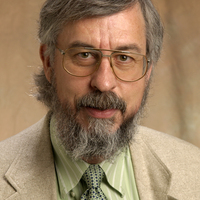- Bruce J. MacLennan
Department of Electrical Engineering & Computer Science
The University of Tennessee
401 Min Kao EECS Bldg.
Knoxville, TN 37996
Textbook for unconventional computation including quantum computation. September 1, 2021 edition.
Research Interests:
Jung's Red Book is remarkable: visually stunning, imposing (both the original and the facsimile), mysterious, illuminating the development both of C. G. Jung as an individual and of Jungian psychology as a movement. From another... more
Jung's Red Book is remarkable: visually stunning, imposing (both the original and the facsimile), mysterious, illuminating the development both of C. G. Jung as an individual and of Jungian psychology as a movement. From another perspective, as I argue, The Red Book is unexceptional (except for its aesthetic quality) for it is a typical product of a series of theurgical operations such as have been practiced for thousands of years. As such, The Red Book is especially valuable for our postmodern age, because it is an example of how the spirit of the depths can be encountered and accommodated in our time. This is an abridged preprint of a chapter to appear in Stein & Arzt (Eds.), Jung's Red Book for our Time, Vol. IV (Chiron, 2020).
Research Interests:
A revitalized practice of natural philosophy can help people to live a better life and promote a flourishing ecosystem. Such a philosophy is natural in two senses. First, it is natural by seeking to understand the whole of nature,... more
A revitalized practice of natural philosophy can help people to live a better life and promote a flourishing ecosystem. Such a philosophy is natural in two senses. First, it is natural by seeking to understand the whole of nature, including mental phenomena, In particular, a comprehensive natural philosophy should address the phenomena of sentience by embracing first-and second-person methods of investigation. Moreover, to expand our understanding of the world, natural philosophy should embrace a full panoply of explanations, similar to Aristotle's four causes. Second, such a philosophy is natural by being grounded in human nature, taking full account of human capacities and limitations. Future natural philosophers should also make use of all human capacities, including emotion and intuition as well as reason and perception, to investigate nature. Finally, since the majority of our brain's activities are unconscious, natural philosophy should explore the unconscious mind with the aim of deepening our relation to the rest of nature and enhancing well-being.
Research Interests:
Jung’s term “individuation” refers to the process of becoming psychologically "individuus," that is, undivided or indivisible; it could almost serve as a translation of henôsis. Moreover, practices in analytical psychology, such has... more
Jung’s term “individuation” refers to the process of becoming psychologically "individuus," that is, undivided or indivisible; it could almost serve as a translation of henôsis. Moreover, practices in analytical psychology, such has active imagination, have direct analogies in theurgy and are directed toward similar ends. In this paper I explore these parallels in order to understand better the means and ends of ancient theurgical practice. In particular, I discuss the experience and effect of henôsis from the perspective of analytical psychology.
Research Interests:
I’ve argue that numbers are not mere quantities and that the first four numbers, in particular, have rich qualitative structures; they are psychologically potent and numinous. Jung and the Jungians have explored these archetypal numbers,... more
I’ve argue that numbers are not mere quantities and that the first four numbers, in particular, have rich qualitative structures; they are psychologically potent and numinous. Jung and the Jungians have explored these archetypal numbers, which have psychodynamical properties common to all people, for they are rooted in the human brain. These properties agree with many of the qualities of the archetypal numbers described in the Theologumena Arithmeticae and other traditional arithmological sources. Therefore a complete Platonic philosophy of mathematics should include the interior, psychodynamical qualitive structure of the numbers as well as their external, formal quantitative structure. The numbers objectively exist, independent of our conscious construction, as potent forces in our psyches and as governors of our lives.
Research Interests:
Jung’s term “individuation,” which refers to the process of becoming psychologically individuus, that is, undivided or indivisible, could almost serve as a translation of henôsis. Practices in analytical psychology, such has active... more
Jung’s term “individuation,” which refers to the process of becoming psychologically individuus, that is, undivided or indivisible, could almost serve as a translation of henôsis. Practices in analytical psychology, such has active imagination, have direct analogies in theurgy and are directed toward similar ends. In this talk I will explore these parallels in order to understand better the means and ends of ancient theurgical practice. In particular, I will discuss the experience and effect of henôsis from the perspective of analytical psychology.
Research Interests:
Jung’s term “individuation,” which refers to the process of becoming psychologically individuus, that is, undivided or indivisible, could almost serve as a translation of henôsis. Practices in analytical psychology, such has active... more
Jung’s term “individuation,” which refers to the process of becoming psychologically individuus, that is, undivided or indivisible, could almost serve as a translation of henôsis. Practices in analytical psychology, such has active imagination, have direct analogies in theurgy and are directed toward similar ends. In this talk I will explore these parallels in order to understand better the means and ends of ancient theurgical practice. In particular, I will discuss the experience and effect of henôsis from the perspective of analytical psychology.
